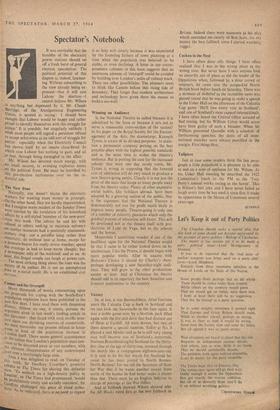Canute and the Overspill
Many thousands of words commenting upon the proposals for coping with the South-East's Population explosion have been published in the Past few days. I have read them with deepening dismay. Almost no one, it seems, pursues the argument aired in last Week's leading article in the Spectator: that faced with such terrific pres- sure upon our shrinking reserves of countryside, we must reconsider our present refusal to house some at least of the population increase in tondon itself. There seems general acquiescence in the notion that London's population must con- tinue to be decanted away in vast numbers, with the ultimate disappearance of any undeveloped land over a terrifyingly large area. Thus I was delighted to read, on Tuesday of this week, Sir Geoffrey Crowther's powerful rebuke to The Times for sharing this defeatist ..v'ew. 'To embark on a high-density policy in London', so The Times had pronounced, 'would be prohibitively costly and socially mistaken'. Sir Geoffrey challenged this piece of timid ortho- oxy. As he indicated, there is no need to regard
it as holy writ simply because it was enunciated by the founding fathers of town planning at a time when the populaion was believed to be stable, or even declining. A letter in our corres- pondence columns in this issue suggests that an enormous amount of 'overspill' could be avoided by building over London's miles of railway track. There are other possibilities. The planners seem to think like Canute before this rising tide of humanity. They forget that modern architecture and technology have given them the means to build a sea-wall.


































 Previous page
Previous page